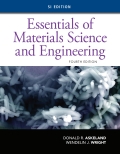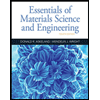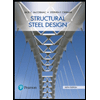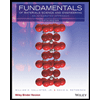
Essentials of Materials Science and Engineering, SI Edition
4th Edition
ISBN: 9781337672078
Author: ASKELAND, Donald R., WRIGHT, Wendelin J.
Publisher: Cengage Learning
expand_more
expand_more
format_list_bulleted
Question
Chapter 14, Problem 14.2P
Interpretation Introduction
Interpretation:
The specific strengths of the given metals and alloys needs to be determined.
Concept Introduction:
Specific strength is defined as the ratio of strength of material to its density that is strength to weight ratio or strength to mass ratio. The SI unit of this property is N.m/kg.
Specific strength is also known as breaking length and support length.
Carbon fiber, glass fiber, and several polymers are the best example with high specific strength and these materials are mostly used as composite materials.
Expert Solution & Answer
Want to see the full answer?
Check out a sample textbook solution
Students have asked these similar questions
A circularly polarized wave, traveling in the +z-direction, is received by an elliptically
polarized antenna whose reception characteristics near the main lobe are given approx-
imately by
E„ = [2â, + jâ‚]ƒ(r. 8, 4)
Find the polarization loss factor PLF (dimensionless and in dB) when the incident wave
is
(a) right-hand (CW)
An elliptically polarized wave traveling in the negative z-direction is received by a circularly polarized
antenna. The vector describing the polarization of the incident wave is given by Ei= 2ax + jay.Find the
polarization loss factor PLF (dimensionless and in dB) when the wave that would be transmitted by the
antenna is (a) right-hand CP
jX(1)=j0.2p.u.
jXa(2)=j0.15p.u.
jxa(0)=0.15 p.u.
V₁=1/0°p.u.
V₂=1/0° p.u.
1
jXr(1) = j0.15 p.11.
jXT(2) = j0.15 p.u.
jXr(0) = j0.15 p.u.
V3=1/0° p.u.
А
V4=1/0° p.u.
2 jX1(1)=j0.12 p.u. 3 jX2(1)=j0.15 p.u. 4
jX1(2)=0.12 p.11.
JX1(0)=0.3 p.u.
jX/2(2)=j0.15 p.11.
X2(0)=/0.25 p.1.
Figure 1. Circuit for Q3 b).
Please solve the question by hand with a detailed explanation of the steps.
Chapter 14 Solutions
Essentials of Materials Science and Engineering, SI Edition
Ch. 14 - Prob. 14.1PCh. 14 - Prob. 14.2PCh. 14 - Prob. 14.3PCh. 14 - Prob. 14.4PCh. 14 - Prob. 14.5PCh. 14 - Prob. 14.6PCh. 14 - Prob. 14.7PCh. 14 - Prob. 14.8PCh. 14 - Prob. 14.9PCh. 14 - Prob. 14.10P
Ch. 14 - Prob. 14.11PCh. 14 - Prob. 14.12PCh. 14 - Prob. 14.13PCh. 14 - Prob. 14.14PCh. 14 - Prob. 14.15PCh. 14 - Prob. 14.16PCh. 14 - Prob. 14.17PCh. 14 - Prob. 14.18PCh. 14 - Prob. 14.19PCh. 14 - Prob. 14.20PCh. 14 - Prob. 14.21PCh. 14 - Prob. 14.22PCh. 14 - Prob. 14.23PCh. 14 - Prob. 14.24PCh. 14 - Prob. 14.25PCh. 14 - Prob. 14.26PCh. 14 - Prob. 14.27PCh. 14 - Prob. 14.28PCh. 14 - Prob. 14.29PCh. 14 - Prob. 14.30PCh. 14 - Prob. 14.31PCh. 14 - Prob. 14.32PCh. 14 - Prob. 14.33PCh. 14 - Prob. 14.34PCh. 14 - Prob. 14.35PCh. 14 - Prob. 14.36PCh. 14 - Prob. 14.37DPCh. 14 - Prob. 14.38DPCh. 14 - Prob. 14.39DPCh. 14 - Prob. 14.40DPCh. 14 - Prob. 14.41DPCh. 14 - Prob. 14.42DPCh. 14 - Prob. 14.43DPCh. 14 - Prob. 14.44CPCh. 14 - Prob. K14.1KPCh. 14 - Prob. K14.2KP
Knowledge Booster
Similar questions
- can you show me full workings for this problem. the solution is - v0 = 10i2 = 2.941 volts, i0 = i1 – i2 = (5/3)i2 = 490.2mA.arrow_forwardQ4. a) Consider a transmission line modelled as a four-terminal network with an unknown configuration. You are provided with the following measured parameters at the operating frequency: Open-circuit voltage ratio: 0.9521° • Short-circuit impedance: 40+j80 • Open-circuit admittance: -j2 × 10-4 S Use the four terminal equations and the provided measurements to mathematically derive the A, B, C, and D parameters of the network and explain their physical significance. Show your work and formulas used in the derivation.arrow_forwardQ1. Consider a single-phase step-down transformer with primary and secondary turns of 600 and 100 respectively and a primary voltage of 11 kV. (i) An open circuit test was conducted on the transformer and the primary current was measured as: I₁ = 2.20 A Use these results to calculate the magnetising reactance in the equivalent circuit (X) given that Rm, representing the core loss, has a value of 21 km. (ii) The remaining equivalent circuit parameters are as follows: R₁ = 40, X₁ = 25 N, R₂ = 0.4 N, X₂ = 0.3 N Draw the complete simplified equivalent circuit, by referring series components on the primary side to the secondary, giving all component values. (iii) The transformer is connected, on its secondary side, to a load of 10 at a power factor of 1. Calculate the voltage across the load. (iv) Calculate the efficiency of the transformer when operating at the load given in part (iii).arrow_forward
- b) A 132 kV supply feeds a line of reactance 15 which is connected to a 100 MVA, 132/33 kV transformer of 0.08 p.u. reactance as shown in the Figure 2. The transformer feeds a 33 kV line of reactance 8 Q, which, in turn, is connected to a 75 MVA, 33/11 KV transformer of 0.12 p.u. reactance. The transformer supplies an 11 KV substation from which a local 11 kV feeder of 4 Q reactance is supplied. T1 T2 132 kV 33 kV 11 kV Fault X CB Relay Figure 2. Network for Q4 b). (i) Given the system base of 100 MVA, compute the total equivalent reactance of the radial circuit in per unit (p.u.). (ii) Determine the three-phase fault current at the load end of the 11 kV feeder, assuming a fault impedance of 0.05 Q. Calculate the fault current in Amperes. (iii) The 11 kV feeder connects to a protective overcurrent relay via 200/5 A current transformers. This relay has a standard normally inverse IDMT characteristic, with a setting current of 3 A and a time multiplier setting of 0.4. Calculate the…arrow_forwardQ2. a) Two three-phase transformers, designated A and B, have the following secondary equivalent circuit parameters per phase: R₁ = 0.002 Q, XA = 0.03 Q, RB = 0.004 Q, X = 0.012 Q Transformer A is 250 kVA and transformer B is 450 kVA. Calculate how they share a load of 650 KVA when connected in parallel (assume the voltage ratios are equal) b) A step-up transformer is being specified for the beginning of a 3-phase, 4 wire high voltage transmission line. Discuss your recommendation for the configuration of the transformer connections on both the primary and secondary side of the transformer. c) Define power system protection and describe its fundamental purpose. Discuss the following key concepts including discrimination, stability, speed of operation, sensitivity, and reliability in the context of the power system protection components and schemes.arrow_forwardFour-bar linkage mechanism, AB=40mm, BC=60mm, CD=70mm, AD=80mm, =60°, w1=10rad/s. Determine the direction and magnitude of w3 using relative motion graphical method. A B 2 3 77777 477777arrow_forward
- Four-bar linkage mechanism, AB=40mm, BC=60mm, CD=70mm, AD=80mm, =60°, w1=10rad/s. Determine the direction and magnitude of w3 using relative motion graphical method. A B 2 3 77777 477777arrow_forwardQ3. a) Given the unsymmetrical phasors for a three-phase system, they can be represented in terms of their symmetrical components as follows: [Fa] [1 1 Fb = 1 a² [Fc. 11[Fao] a Fai 1 a a2F a2- where F stands for any three-phase quantity. Conversely, the sequence components can be derived from the unsymmetrical phasors as: [11 1] [Fal Faol Fa1 = 1 a a² F 1 a² a a2. Given the unbalanced three-phase voltages: V₁ = 120/10° V, V₂ = 200/110° V, V = 240/200° V Calculate in polar form the sequence components of the voltage.arrow_forwardComplete the table of values for this circuit:arrow_forward
- *P2.58. Solve for the node voltages shown in Figure P2.58. - 10 Ω w + 10 Ω 15 Ω w w '+' 5 Ω 20x 1 A Figure P2.58 w V2 502 12Aarrow_forwardAn average operating data for conventional activated sludge treatment plant is as follows: (1) Wastewater flow, Q = 50000m³/darrow_forwardA- Design grit removal chamber for a W.W.P with hourly flow equal 5000 m'h B-Answer five of the following: 1-....... is the storm runoff that occurs from rainfall? (15 mark) (10 mark) 2- A protective device used to remove large and coarse materials from the wastewater 3-....... utilize a relative porous bacteria growth medium such as rock or formed plastic shapes 4- There are two basic methods of introducing air into the aeration tanks are....... And ......... 5-..... to water bodies such as rivers will be described by Streeter- Phelp's equation 6- .... is the liquid conveyed by a sewer, it may consist of any one or a mixture of liquid wastes.arrow_forward
arrow_back_ios
SEE MORE QUESTIONS
arrow_forward_ios
Recommended textbooks for you
 MATLAB: An Introduction with ApplicationsEngineeringISBN:9781119256830Author:Amos GilatPublisher:John Wiley & Sons Inc
MATLAB: An Introduction with ApplicationsEngineeringISBN:9781119256830Author:Amos GilatPublisher:John Wiley & Sons Inc Essentials Of Materials Science And EngineeringEngineeringISBN:9781337385497Author:WRIGHT, Wendelin J.Publisher:Cengage,
Essentials Of Materials Science And EngineeringEngineeringISBN:9781337385497Author:WRIGHT, Wendelin J.Publisher:Cengage, Industrial Motor ControlEngineeringISBN:9781133691808Author:Stephen HermanPublisher:Cengage Learning
Industrial Motor ControlEngineeringISBN:9781133691808Author:Stephen HermanPublisher:Cengage Learning Basics Of Engineering EconomyEngineeringISBN:9780073376356Author:Leland Blank, Anthony TarquinPublisher:MCGRAW-HILL HIGHER EDUCATION
Basics Of Engineering EconomyEngineeringISBN:9780073376356Author:Leland Blank, Anthony TarquinPublisher:MCGRAW-HILL HIGHER EDUCATION Structural Steel Design (6th Edition)EngineeringISBN:9780134589657Author:Jack C. McCormac, Stephen F. CsernakPublisher:PEARSON
Structural Steel Design (6th Edition)EngineeringISBN:9780134589657Author:Jack C. McCormac, Stephen F. CsernakPublisher:PEARSON Fundamentals of Materials Science and Engineering...EngineeringISBN:9781119175483Author:William D. Callister Jr., David G. RethwischPublisher:WILEY
Fundamentals of Materials Science and Engineering...EngineeringISBN:9781119175483Author:William D. Callister Jr., David G. RethwischPublisher:WILEY

MATLAB: An Introduction with Applications
Engineering
ISBN:9781119256830
Author:Amos Gilat
Publisher:John Wiley & Sons Inc

Essentials Of Materials Science And Engineering
Engineering
ISBN:9781337385497
Author:WRIGHT, Wendelin J.
Publisher:Cengage,

Industrial Motor Control
Engineering
ISBN:9781133691808
Author:Stephen Herman
Publisher:Cengage Learning

Basics Of Engineering Economy
Engineering
ISBN:9780073376356
Author:Leland Blank, Anthony Tarquin
Publisher:MCGRAW-HILL HIGHER EDUCATION

Structural Steel Design (6th Edition)
Engineering
ISBN:9780134589657
Author:Jack C. McCormac, Stephen F. Csernak
Publisher:PEARSON

Fundamentals of Materials Science and Engineering...
Engineering
ISBN:9781119175483
Author:William D. Callister Jr., David G. Rethwisch
Publisher:WILEY